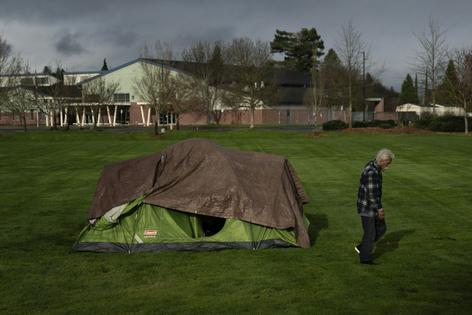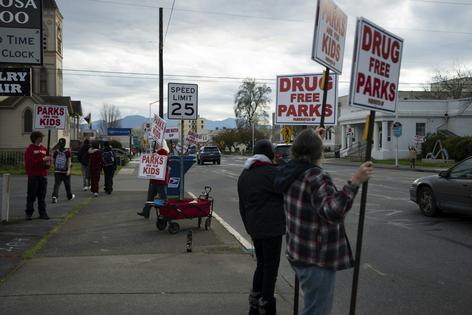Supreme Court to consider whether local governments can make it a crime to sleep outside if no inside space is available
Published in Political News
On April 22, 2024, the Supreme Court will hear a case that could radically change how cities respond to the growing problem of homelessness. It also could significantly worsen the nation’s racial justice gap.
City of Grants Pass v. Johnson began when a small city in Oregon with just one homeless shelter began enforcing a local anti-camping law against people sleeping in public using a blanket or any other rudimentary protection against the elements – even if they had nowhere else to go. The court must now decide whether it is unconstitutional to punish homeless people for doing in public things that are necessary to survive, such as sleeping, when there is no option to do these acts in private.
The case raises important questions about the scope of the Constitution’s cruel and unusual punishment clause and the limits of cities’ power to punish involuntary conduct. As a specialist in poverty law, civil rights and access to justice who has litigated many cases in this area, I know that homelessness in the U.S. is a function of poverty, not criminality, and is strongly correlated with racial inequality. In my view, if cities get a green light to continue criminalizing inevitable behaviors, these disparities can only increase.
Homelessness in the United States is a massive problem. The number of people without homes held steady during the COVID-19 pandemic largely because of eviction moratoriums and the temporary availability of expanded public benefits, but it has risen sharply since 2022.
The latest data from the federal government’s annual “Point-in-Time” homeless count found 653,000 people homeless across the U.S. on a single night in 2023 – a 12% increase from 2022 and the highest number reported since the counts began in 2007. Of the people counted, nearly 300,000 were living on the street or in parks, rather than indoors in temporary shelters or safe havens.
The survey also shows that all homelessness is not the same. About 22% of homeless people are deemed chronically homeless, meaning they are without shelter for a year or more, while most experience a temporary or episodic lack of shelter. A 2021 study found that 53% of homeless shelter residents and nearly half of unsheltered people were employed.
Scholars and policymakers have spent many years analyzing the causes of homelessness. They include wage stagnation, shrinking public benefits, inadequate treatment for mental illness and addiction, and the politics of siting affordable housing. There is little disagreement, however, that the simple mismatch between the vast need for affordable housing and the limited supply is a central cause.
Like poverty, homelessness in the U.S. is not race-neutral. Black Americans represent 13% of the population but comprise 21% of people living in poverty and 37% of people experiencing homelessness.
The largest percentage increase in homelessness for any racial group in 2023 was 40% among Asians and Asian-Americans. The largest numerical increase was among people identifying as what the Department of Housing and Urban Development calls “Latin(a)(o)(x),” with nearly 40,000 more homeless in 2023 than in 2022.
This disproportionality means that criminalizing homelessness likewise has a disparate racial effect. A 2020 study in Austin, Texas, showed that Black homeless people were 10 times more likely than white homeless people to be cited by police for camping on public property.
According to a recent report from the Southern Poverty Law Center, 1 in 8 Atlanta city jail bookings in 2022 were of people experiencing homelessness. The criminalization of homelessness has roots in historical use of vagrancy and loitering laws against Black Americans dating back to the 19th century.
Increasing homelessness, especially its visible manifestations such as tent encampments, has frustrated city residents, businesses and policymakers across the U.S. and led to an increase in crackdowns against homeless people. Reports from the National Homelessness Law Center in 2019 and 2021 have tallied hundreds of laws restricting camping, sleeping, sitting, lying down, panhandling and loitering in public.
Just since 2022, Texas, Tennessee and Missouri have passed statewide bans on camping on public property, with Texas making it a felony.
Georgia has enacted a law requiring localities to enforce public camping bans. Even some cities led by Democrats, including San Diego and Portland, Oregon, have established tougher anti-camping regulations.
Under presidents Barack Obama and Joe Biden, the federal government has asserted that criminal sanctions are rarely useful. Instead it has emphasized alternatives, such as supportive services, specialty courts and coordinated systems of care, along with increased housing supply.
Some cities have had striking success with these measures. But not all communities are on board.
Grants Pass v. Johnson culminates years of struggle over how far cities can go to discourage homeless people from residing within their borders, and whether or when criminal sanctions for actions such as sleeping in public are permissible.
In a 2019 case, Martin v. City of Boise, the 9th U.S. Circuit Court of Appeals held that the Eighth Amendment’s cruel and unusual punishment clause forbids criminalizing sleeping in public when a person has no private place to sleep. The decision was based on a 1962 Supreme Court case, Robinson v. California, which held that it is unconstitutional to criminalize being a drug addict. Robinson and a subsequent case, Powell v. Texas, have come to stand for distinguishing between status, which cannot constitutionally be punished, and conduct, which can.
In the Grants Pass ruling, the 9th Circuit went one step further than it had in the Boise case and held that the Constitution also banned criminalizing the act of public sleeping with rudimentary protection from the elements. The decision was contentious: Judges disagreed over whether the anti-camping ban regulated conduct or the status of being homeless, which inevitably leads to sleeping outside when there is no alternative.
Grants Pass is urging the Supreme Court to abandon the Robinson precedent and its progeny as “moribund and misguided.” It argues that the Eighth Amendment forbids only certain cruel methods of punishment, which do not include fines and jail terms.
The homeless plaintiffs argue that they do not challenge reasonable regulation of the time and place of outdoor sleeping, the city’s ability to limit the size or location of homeless groups or encampments, or the legitimacy of punishing those who insist on remaining in public when shelter is available. But they argue that broad anti-camping laws inflict overly harsh punishments for “wholly innocent, universally unavoidable behavior” and that punishing people for “simply existing outside without access to shelter” will not reduce this activity.
They contend that criminalizing sleeping in public when there is no alternative violates the Eighth Amendment in three ways: by criminalizing the “status” of homelessness, by imposing disproportionate punishment on innocent and unavoidable acts, and by imposing punishment without a legitimate deterrent or rehabilitative goal.
The case has attracted dozens of amicus briefs, including from numerous cities and counties that support Grants Pass. They assert that the 9th Circuit’s recent decisions have worsened homelessness, stymied law enforcement and left jurisdictions without clear guidelines for preserving public order and safety.
On the other hand, the states of Maryland, Illinois, Massachusetts, Minnesota, New York and Vermont filed a brief urging the Court to uphold the 9th Circuit’s ruling, arguing that local governments retain ample tools to address homelessness and that criminalizing tends to worsen rather than alleviate the problem.
A brief from 165 former local elected officials agrees. Service providers, social scientists and professional organizations such as the American Psychiatric Association filed briefs noting that criminalization increases barriers to education, employment and eventual recovery; erodes community trust; and can force people back into abusive situations. They also highlight research showing the effectiveness of a nonpunitive “housing first” model.
The current Supreme Court is generally extremely sympathetic to law enforcement, but even its conservative members may balk at allowing a city to criminalize inevitable acts by homeless people. Doing so could spark competition among cities to create the most punitive regime in hopes of effectively banishing homeless residents.
Still, at least some justices may sympathize with the city’s argument that upholding the 9th Circuit’s ruling “logically would immunize numerous other purportedly involuntary acts from prosecution, such as drug use by addicts, public intoxication by alcoholics, and possession of child pornography by pedophiles.” However the court rules, this case will likely affect the health and welfare of thousands of people experiencing homelessness in cities across the U.S.
This article is republished from The Conversation, a nonprofit, independent news organization bringing you facts and analysis to help you make sense of our complex world.
Read more:
Domestic violence survivors seek homeless services from a system that often leaves them homeless
Shelters can help homeless people by providing quiet and privacy, not just a bunk and a meal
Clare Pastore is a former Senior Counsel for the American Civil Liberties Union of Southern California, which is one of the ACLU offices included in the organization's amicus brief in the case supporting the homeless litigants in city of Grants Pass v. Johnson. Her employment with the ACLU ended in 2007, years before this case was filed.











Comments